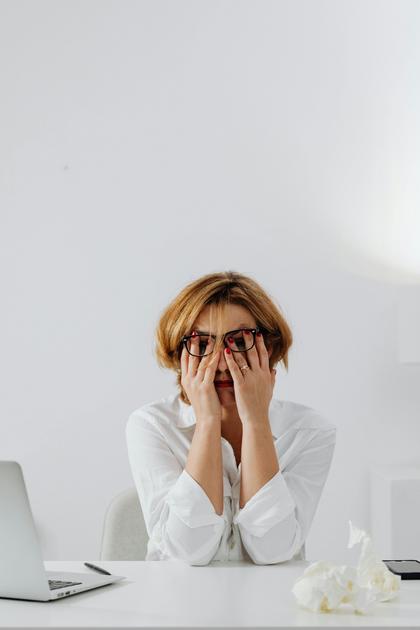Have you ever found yourself tossing and turning at night? You’re not alone. Many women’s sleep is disrupted by anxiety and daily stress, leading to a cycle of fatigue and emotional exhaustion. The pressures of balancing work, family, and personal life can weigh heavily, making peaceful rest seem like a distant dream. Understanding the connection between your mental health and sleep quality is the first step toward reclaiming restful nights.
But there’s hope! With the right strategies, you can combat these feelings and improve your sleep. Explore how to soothe anxiety and restore your sleep patterns.
See here how many women are resolving this without heavy medications.
Understanding the Impact of Anxiety on Sleep
Many women experience sleep difficulties due to anxiety. When we feel anxious, our minds race with worries about work, family, or future uncertainties. This constant chatter can prevent us from relaxing enough to fall asleep. Ignoring these feelings can worsen sleep issues.
Studies show that anxiety disorders are one of the leading causes of sleep disruptions. Women are particularly vulnerable, especially those over 30. Our responsibilities can create a perfect storm of stress and anxiety, leading to sleepless nights.
Understanding how anxiety affects your sleep is the first step toward finding relief. You may notice your sleep becomes shallow or interrupted. Instead of a restful night, you might be waking up multiple times or struggling to return to sleep. Recognizing these patterns can empower you to take action.
The Role of Daily Stress in Sleep Disruption
Daily stressors — from job pressures to family obligations — can deeply impact your ability to sleep well. Women often juggle many roles, which can lead to chronic stress. This stress can elevate cortisol levels, making it harder to unwind.
Consider how your daily activities might contribute to your stress levels:
- Work Pressure: Tight deadlines and demanding boss can keep your mind racing.
- Family Commitments: Balancing children’s schedules and relationships creates mental strain.
- Societal Expectations: The pressure to ‘do it all’ can be overwhelming.
Taking frequent pauses throughout your day can help mitigate this stress. A moment of mindfulness can allow you to reset and prepare for better sleep.
Signs That Your Sleep Is Affected
It’s essential to identify if anxiety and daily stress are affecting your sleep. Here are some signs to watch out for:
- Difficulty Falling Asleep: Tossing and turning becomes routine.
- Frequent Waking: Interrupted sleep can lead to groggy mornings.
- Daytime Fatigue: Consistently feeling tired can be a cue.
- Mood Changes: Increased irritability or sadness can signal sleep issues.
If you notice these symptoms, it’s vital to take them seriously. They can indicate that you’re stuck in a cycle that needs to be broken.
Natural Remedies for Stress Relief
Exploring natural remedies can be an excellent way to alleviate stress and improve sleep. Here are a few options many women have found helpful:
- Herbal Teas: Chamomile and lavender tea can soothe your mind before bed.
- Aromatherapy: Consider essential oils like lavender or sandalwood.
- Breathing Exercises: Simple techniques can help calm your nervous system.
These remedies can gently ease your mind and prepare your body for rest. You might be amazed at the impacts such small changes can have.
Creating a Calming Bedtime Routine
Establishing a calming bedtime routine is crucial for promoting better sleep. Think of it as preparing yourself to transition gently into rest. Here are some ideas to enhance your evening routine:
- Set a Regular Sleep Schedule: Go to bed and wake up at the same time every day.
- Wind Down: Dedicate 30 minutes to relax with a book or soothing music.
- Limit Screen Time: Reduce exposure to screens at least one hour before bed.
Creating this peaceful atmosphere acts as an invitation for better sleep.
The Importance of Sleep Hygiene
Sleep hygiene refers to good habits that promote consistent sleep quality. Here’s how you can improve your sleep hygiene:
- Comfortable Sleep Environment: Ensure your bedroom is cool, dark, and quiet.
- Invest in Quality Bedding: Comfortable pillows and mattresses matter.
- Limit Caffeine and Alcohol: These substances can interfere with sleep quality.
Improving sleep hygiene can make a significant difference, pushing you toward a more restful night.
Mindfulness Techniques to Enhance Sleep
Mindfulness can help alleviate anxiety and promote relaxation. Engaging in mindfulness practices before bed can pave the way for peaceful sleep. Here are some techniques:
- Body Scan Meditation: Mentally check in with each part of your body, releasing tension.
- Guided Imagery: Picture peaceful scenes to divert your mind from stress.
- Journaling: Write down your thoughts to clear your mind before sleeping.
These practices introduce calm into your evenings, helping your anxiety fade away.
Nutrition Tips for Better Sleep
Your diet plays a role in how well you sleep. Focus on consuming foods that support good sleep. Consider these suggestions:
- Magnesium-rich foods: Spinach, nuts, and seeds can help relax the body.
- Complex Carbohydrates: Whole grains promote serotonin, aiding sleep.
- Hydration: Drink water throughout the day but limit fluids before bed.
Nourishing your body with the right foods can promote restful sleep.
Recognizing When to Seek Help
Sometimes, self-help techniques are not enough. If sleep issues persist, it may be time to seek professional guidance. Consider discussing with a healthcare provider if:
- Sleep problems last longer than a few weeks.
- Daily life is significantly affected by fatigue.
- You experience symptoms of anxiety or depression.
The right support can pave the way for resolution and provide you with coping mechanisms.
Inspiring Stories of Women Who Found Relief
Many women have faced the challenges of anxiety and disrupted sleep. Their journeys to find relief are both inspiring and empowering. Consider one woman who struggled for years with insomnia due to stress from work and family.
She began adopting mindfulness practices and created a calming bedtime routine. Over time, her sleep improved, and so did her overall sense of well-being. Hearing stories like hers can motivate you to follow suit and explore your path to relief.
As you navigate this journey, remember that it is possible to improve your symptoms. Many women have done it by taking small, meaningful steps toward better sleep and reduced anxiety. Find your relief today!







